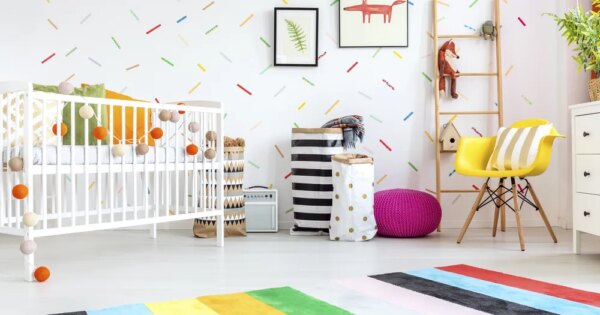Finding out that you’re expecting two babies instead of one is a little daunting (to say the least) but many parents (myself included) have done it and managed to survive. When my husband and I first found out we were expecting two little bundles of joy, I immediately started researching everything I could about caring for two babies at once. Luckily, there were a ton of gracious twin parents sharing their experiences online, which helped us successfully navigate the first year of our children’s lives. Our twins (Alexander and Ava) will be two later this year and, now that we’ve officially made it through the first 18 months (the biggest parental milestone from what I’ve been told), I feel it is my duty to pay it forward and offer some personal advice to new twin parents looking for guidance in the first year.
With that said, here are my 10 Essential Tips For Twin Parents In The First Year:
10. Stick to a Schedule
Parents of single babies may have the luxury of flexibility when it comes to schedules but twin parents do not. Establishing a schedule as early as possible will be the key to surviving the first year. Sure, this schedule will change as your babies grow but always having a strict schedule when it comes to feeding, changing and naps will ensure you don’t lose your mind trying to care for these two small humans at the same time.
So what exactly do I mean when I say “stick to a schedule”? I mean, if one baby wakes up in the night to feed you need to wake the other one up and feed them (either at the same time or right after). It may seem ludicrous to wake a sleeping baby but if you don’t you will constantly be at the mercy of their schedules. As early as possible you should be (if you can) feeding both babies at once, putting both babies down for naps at once (this can be tricky in the first few months – especially if they need to be rocked to sleep and you’re the only one with them) and changing them one right after the other (for the most part). The times of your schedule will change as they get older but always sticking to this routine will help you keep your sanity (trust me).
9. Separate As Soon As Possible
Every parent is going to have their own preference when it comes to caring for their baby (or babies, in this case). My husband and I decided to separate our twins into separate cribs soon after they came home from the hospital and it worked for us. That said, I know a lot of twin parents who have kept their babies in the same crib for months and it worked for them too. For us, giving each of them their own space seemed like a good idea (and it was). They both slept well from the beginning and they didn’t become too dependent on each other in the crib.
Allowing your babies to share a crib in the beginning may provide a better bonding experience for them outside of the womb but it can potentially lead to separation anxiety when they’re a little older and you finally decide to make the transition.
8. Keep A Feeding Journal
It doesn’t matter if you’re breastfeeding and/or bottle feeding – feeding two babies at once is one of the most difficult parts of having twins. Many twin moms face the harsh reality of having to breastfeed and/or bottle feed (x2) and pump several times over the course of one day. Keeping track of when you feed each baby, how much they drank (if bottle feeding) and how much you pumped is a great way to stay organized.
The first few months are tough. I recently looked back at my journal from that time and I was sleeping in 45-minute increments. We were on a 3-hour schedule – a schedule that starts when the first baby wakes up. I never mastered tandem breastfeeding and they were too small to bottle feed at the same time so I would spend 20 minutes changing/feeding/burping the first baby. Then I would wake up the second baby and spend 20 minutes doing the same with them. At this point, we are about 45 minutes into the schedule. I would then go to sleep for 45 minutes and wake up to pump. Pumping would take about half an hour (including time for washing/sterilizing all of the parts etc) then I would go back to sleep for another 45 minutes before the 3-hour schedule started all over. Trust me, when you’re this tired you need to keep track of what you’re doing. There’s no way you’re going to remember how much they drank or how much you pumped the next morning. The good news is, it gets easier. This phase ends after 2-3 months.
7. Get Amazon Prime
It might sound like a sales pitch (and, yes, we are affiliated with Amazon) but getting Amazon Prime will not only save you money but will save you time and energy (the two things you lack the most of in the first year). The amount of money you’ll save goes without saying (15-20% on diapers, wipes etc should be reason enough to sign up) and having these items delivered to your door instead of having to pack up two babies and take them to the store is truly something special.
If you take some time to calculate the amount of money you will spend on diapers, wipes, diaper genie refills, formula (if formula feeding) etc. (all X2, remember) and shave off 15-20 percent it will really put things into perspective. We waited until our twins were 15 months before signing up and we definitely regretted not doing it sooner.
6. Take Advantage of Grocery Delivery/Pick-Up Services
This is one thing I wish I did when I was on maternity leave. As I said before, we waited until the twins were 15 months before signing up for Amazon Prime which meant I was packing both babies up (in the middle of winter no less) and going to the grocery store. Little did I know that many big box stores (like Walmart and Costco) offer grocery delivery and/or grocery pick up programs. Using these services on an as-needed basis will definitely help you out when you don’t want to make that trek to the grocery store.
5. Stay Positive
This one isn’t just me telling you to stay positive for you – it’s (even more so) for the children. One thing I noticed that I wish someone would have told me earlier was just how much my mood affected my babies’ moods. This is likely the case with any baby (whether you have twins or just one) but the happier and more positive you are, the happier and more positive they are.
This was a huge revelation for me – and a game-changer during difficult times like the witching hour. I would be so nervous about tackling that time of day on my own that my whole mood would change. In turn, their moods changed as well and we headed into the worst time of every day with negative vibes. Some days it’s tough but try your best to stay happy and positive and your babies will likely follow suit.
4. Get Help
This is on every twin parent’s list and it’s one piece of advice every twin parent gave me before my little ones arrived. If you’re lucky enough (like I was) to have supportive family and friends with the flexibility of being able to help you on a regular basis, take it. Take all of it. Whether someone is offering to make you dinner, do your groceries, look after the kids so you can take a nap etc. – take it all (and be sure to let them know how much you appreciate it).
If you don’t have family and friends who can help and you have the means to hire help, do it. Many twin parents hire someone to come in to help during the night (especially if your significant other works and you don’t want to wake them up in the night). If you don’t have a lot of extra cash, it’s definitely worth seeing if a young kid in your neighbourhood is looking to make some extra money by doing simple tasks like washing your dishes, doing your laundry etc.
3. Divide and Conquer
Whether it’s taking shifts at night or 1-on-1 outings with the babies, dividing and conquering is one of the biggest keys to success in the first year. The most overwhelming part of having twins is the feeling of being outnumbered and, if you can avoid that, then your stress levels will stay low. The problem is, you and your significant other can’t physically be present all day everyday (wouldn’t that be nice, though?).
When these opportunities arise, take advantage of them. Taking one baby out, 1-on-1, is a lot less stressful than taking two babies out on your own (obviously) but it’s also a lot less stressful than you and your significant other taking both babies out together. Venturing out with two babies the same age is chaotic at the best of times, so I strongly encourage dividing and conquering when you can.
2. Don’t Compare
Attempting to do everything your friends do with their new little ones will end up causing you stress and anxiety. The reality is, you have two small babies to take care of – and that’s a lot of work. Friends with a new baby and a toddler may think it’s a similar situation but it’s not. A toddler can help (to an extent) and has a general sense of safety and the ability to communicate to some extent. Trying to look after two babies (or toddlers) at the same stage is incredibly tricky – so give yourself a break and don’t sign up for all of the activities, events and get-togethers your friends are. Trust me, you’ll be happier in the end.
1. Pack Lightly
This may seem like a difficult task given you are taking two babies everywhere with you but being strategic about what you put in your diaper bag (or stroller etc) will help curb the exhaustion you feel during everyday outings with twins.
When they’re really small, you have to carry your babies in their bucket car seats. Imagine carrying 2 babies (over 15lbs each) in their bucket car seats with your purse and the diaper bag and any “extras” you may need for the day. It’s insane. The first thing I suggest is eliminating the purse (or transitioning to a small – very small – clutch) and putting the necessities from your purse into a compartment in your diaper bag. In addition, limit the number of toys or “extras” you take out – the last thing you need is more weight to carry.













